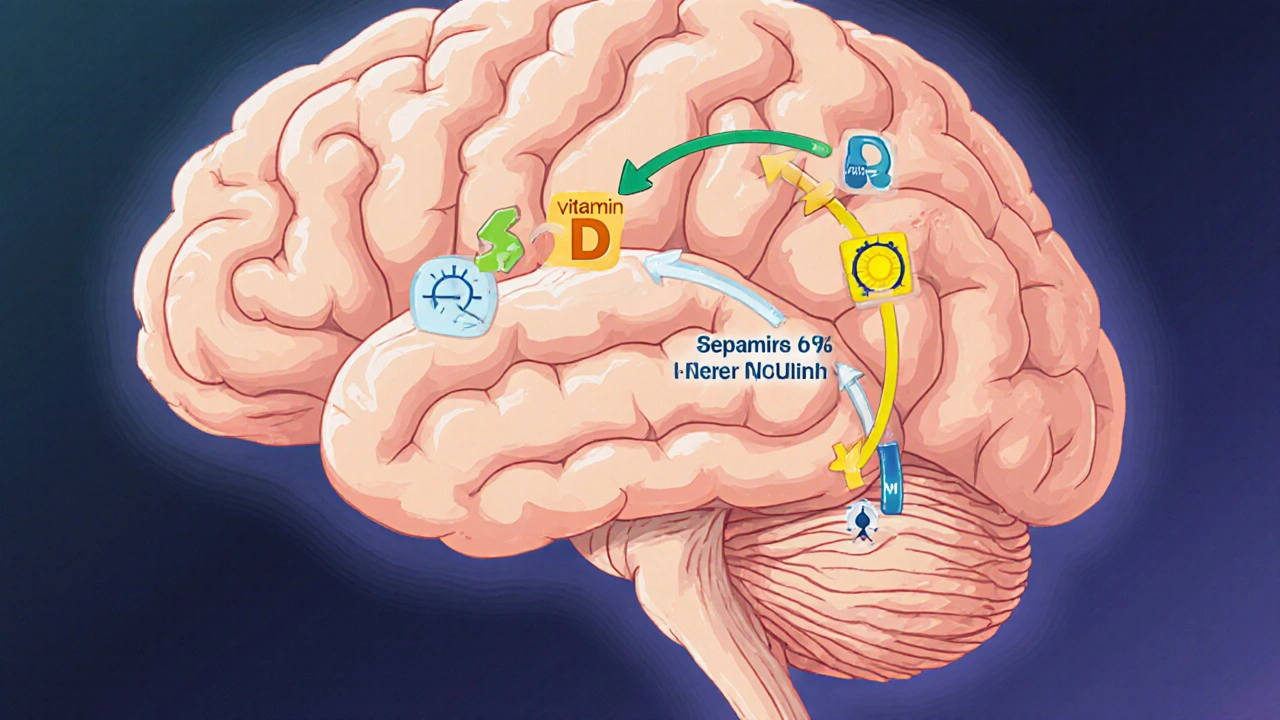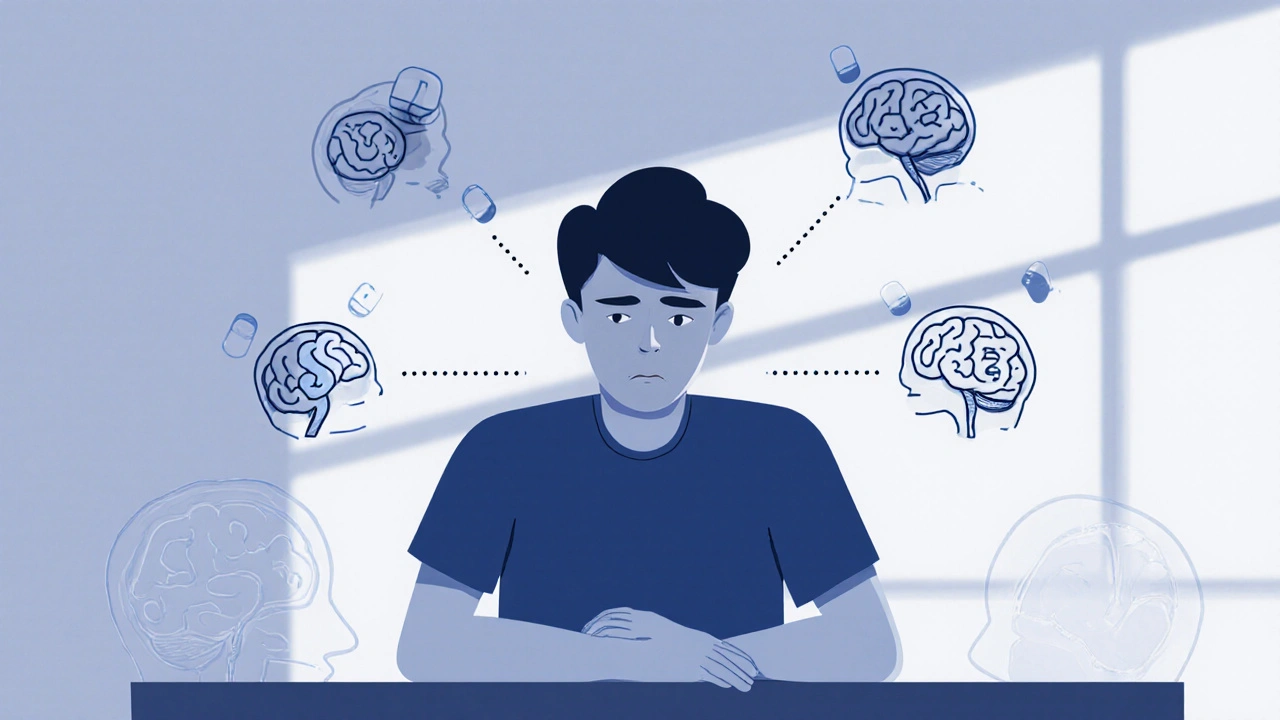Vitamin Deficiency Mood Assessment
This assessment helps identify which vitamin deficiencies might be contributing to your mood symptoms. Select the symptoms you're experiencing, and we'll show you which vitamins might need attention based on current research.
Select Your Symptoms
Ever felt unusually low, irritable, or anxious and wondered if a missing nutrient could be the culprit? You’re not alone. A growing body of research shows that certain vitamin shortfalls can tip the balance of brain chemistry, leading to mood swings, depression, or anxiety. This guide walks you through the science, the signs to watch for, and practical steps to get back on track.
Quick Takeaways
- Vitamin D, B12, B6, folate, and vitamin C are the top nutrients linked to mood changes.
- Deficiencies often masquerade as fatigue, brain fog, or mild depression.
- Simple blood tests can pinpoint the gap.
- Dietary tweaks plus targeted supplements correct most shortfalls within weeks.
- Seek professional help if mood symptoms persist despite correction.
Understanding Vitamin Deficiency
Vitamin deficiency is a condition where the body lacks sufficient amounts of one or more essential vitamins to perform normal physiological functions. Without adequate levels, enzymes can’t work properly, neurotransmitter production falters, and the brain’s mood‑regulating circuits become unstable. While genetics and lifestyle matter, diet remains the most direct lever you can pull.
How Nutrients Influence Brain Chemistry
Vitamins act as co‑factors for enzymes that synthesize neurotransmitters - the chemical messengers behind emotions. For example, vitamin B6 helps convert the amino acid tryptophan into serotonin, the “feel‑good” molecule. Vitamin D interacts with receptors in the hypothalamus, influencing dopamine pathways that control motivation and reward. When any of these nutrients dip, the cascade can lead to lower serotonin or dopamine levels, manifesting as depression or anxiety.
Key Vitamins Linked to Mood Disorders
Vitamin D
Often called the “sunshine vitamin,” vitamin D deficiency is one of the most common worldwide, especially in higher latitudes during winter. Low serum 25‑(OH)D is associated with higher scores on depression scales. Sunlight triggers skin synthesis, but many adults get less than 600 IU daily from food alone.
Vitamin B12
B12 is crucial for myelin formation and the synthesis of norepinephrine and serotonin. Deficiency can cause numbness, memory gaps, and a slumped mood. Vegans and older adults are at higher risk because B12 is primarily found in animal products.
Vitamin B6
Known for its role in converting tryptophan to serotonin, B6 deficiency can lead to irritability and depressive symptoms. It also supports GABA production, a calming neurotransmitter.
Folate (VitaminB9)
Folate works hand‑in‑hand with B12 in the methylation cycle, affecting neurotransmitter balance. Low folate levels have been observed in patients with major depressive disorder, and supplementation often boosts antidepressant efficacy.
Vitamin C
Beyond its antioxidant power, vitamin C is needed to convert dopamine to norepinephrine. Deficiency may result in fatigue, low mood, and increased cortisol response to stress.

Spotting Symptoms of Deficiency
- Persistent low energy and brain fog
- Unexplained irritability or mood swings
- Sleep disturbances (insomnia or excessive sleep)
- Physical signs - hair loss, brittle nails, or dry skin
- Cravings for carbs or sweets, which can be a sign of low B‑vitamin levels
If you notice several of these together, a nutrient audit is worth considering.
Testing and Diagnosis
A simple blood panel can assess serum levels of vitamin D, B12, folate, and sometimes B6. Laboratories generally flag results as deficient if:
- Vitamin D < 20ng/mL (50nmol/L)
- Vitamin B12 < 200pg/mL
- Folate < 3ng/mL
- Vitamin B6 < 5µg/L
Results guide the dosage and duration of supplementation. Keep a copy of the Blood test report for future reference.
Practical Steps to Address Deficiency
- Get sunlight or a vitaminD supplement. 800-2000IU daily is a common starting point; adjust based on blood levels.
- Include B12‑rich foods: lean meat, fish, dairy, or fortified plant milks. Vegans may need 25-100µg of cyanocobalamin per day.
- Boost B6 with poultry, bananas, chickpeas, and potatoes.
- Eat leafy greens, legumes, and fortified cereals for folate. A 400µg daily supplement works for most adults.
- Snack on citrus fruits, strawberries, and bell peppers to meet the 75mg vitaminC recommendation.
- Consider a high‑quality multivitamin that covers the above nutrients if dietary changes are hard to sustain.
- Re‑test after 8-12 weeks to confirm levels have risen.

When to Seek Professional Help
If mood symptoms linger despite normalizing your vitamin levels, it may be time to consult a mental‑health professional. Severe depression, suicidal thoughts, or panic attacks require immediate attention. Nutrient therapy is a supportive tool, not a replacement for psychotherapy or medication when those are indicated.
FAQ
Can vitamin deficiencies cause anxiety?
Yes. Low vitamin D and B‑vitamin levels have been linked to heightened cortisol and reduced GABA activity, both of which can amplify anxiety symptoms.
How quickly can mood improve after fixing a deficiency?
Most people notice better energy and steadier mood within 2-4 weeks of adequate supplementation, though full mental‑health benefits may take up to three months.
Are there risks to taking high‑dose vitamin supplements?
Excessive vitamin D can lead to hypercalcemia, and too much B6 may cause nerve damage. Always follow recommended dosages and check blood levels before exceeding them.
Is a multivitamin enough to treat mood‑related deficiencies?
A high‑quality multivitamin can fill mild gaps, but severe deficiencies often need targeted, higher‑dose supplements prescribed by a clinician.
Can diet alone restore normal mood without supplements?
For many, a balanced diet rich in fish, leafy greens, nuts, and fortified foods can maintain optimal vitamin levels. However, limited sun exposure or absorption issues may still require supplementation.
Comparison Table: Vitamins, Mood Impact, and Recommended Intake
| Vitamin | Primary Mood Effect | Deficiency Symptoms | RDA (Adults) |
|---|---|---|---|
| Vitamin D | Boosts serotonin & dopamine | Depression, fatigue, bone pain | 600-800 IU |
| Vitamin B12 | Supports norepinephrine & serotonin | Low mood, memory loss, tingling | 2.4 µg |
| Vitamin B6 | Facilitates serotonin synthesis | Irritability, confusion | 1.3-2.0 mg |
| Folate (B9) | Works with B12 in methylation | Depression, poor concentration | 400 µg |
| Vitamin C | Converts dopamine to norepinephrine | Fatigue, mood swings | 75-90 mg |
By understanding which nutrients are missing and taking targeted steps, you can regain emotional balance without relying solely on medication. Remember, the brain thrives on a steady supply of vitamins - treat it like you would fuel a car: regular maintenance prevents breakdowns.


Steve Holmes
October 17, 2025 AT 02:13Wow, this guide really breaks down the vitamin‑mood connection, and it’s super helpful, especially for folks who feel “off” without knowing why!!! I love the clear bullet points, and the practical steps are spot‑on, thanks for sharing!
Tom Green
October 28, 2025 AT 06:45Great summary, and I appreciate how you balanced scientific detail with actionable advice; it makes the information accessible for both newbies and seasoned health enthusiasts alike.
James Falcone
November 8, 2025 AT 12:17Honestly, if America wants its citizens to feel less miserable, we need to push for more sunlight and less processed junk – the government should fund vitamin D fortification, period.
Valerie Vanderghote
November 19, 2025 AT 17:50I’ve been thinking about how many times I’ve blamed a bad day on stress, only to discover later that my diet was practically a desert of essential nutrients, and that realization sparked a cascade of self‑reflection that went far beyond just the occasional mood dip; the more I dug into the science, the more I realized that vitamins like B6 and folate are not merely footnotes in a nutrition textbook but central players in the production of serotonin, the very chemical that lifts our spirits, so when those levels dip, it feels as if the world suddenly dims, and that dimming is not just metaphorical-it’s a physiological state that can turn even the most resilient person into someone who panics over small tasks, which is why I now schedule regular blood tests like I would a car’s oil change, because preventive care saves far more than I ever imagined; I also started a habit of journaling my energy and mood each morning, noting any particular cravings for carbs or sweets, because those cravings often signal a B‑vitamin shortfall, and by catching them early I can adjust my meals with bananas, chickpeas, and leafy greens, all of which are rich in those missing nutrients, and over time I’ve felt a steadier baseline of contentment that isn’t as easily shaken by external stressors, proving that the mind‑body connection is truly a two‑way street, and while I’m no medical professional, I’ve learned that the body’s signals are louder than any generic wellness article; therefore, I wholeheartedly recommend anyone feeling inexplicably low to get a comprehensive vitamin panel, because a simple blood draw can illuminate hidden deficiencies that are silently steering our emotions, and once you address those gaps with thoughtful supplementation or diet tweaks, you’ll likely notice a ripple effect that improves sleep, focus, and overall zest for life, making every day feel a little brighter.
Michael Dalrymple
November 30, 2025 AT 23:22Your emphasis on checking blood levels before self‑prescribing supplements reflects a prudent, evidence‑based approach, which I wholeheartedly endorse.
RJ Samuel
December 12, 2025 AT 04:54Interesting take, but I’d argue that focusing solely on vitamins oversimplifies the complex neurochemical orchestra; lifestyle, genetics, and even gut microbiota play starring roles.
Kate Marr
December 23, 2025 AT 10:26Can’t ignore how our diet shapes mood 😊
Frank Diaz
January 3, 2026 AT 15:59While you cheerfully highlight nutrients, it’s worth noting that many people misuse supplements, chasing quick fixes instead of addressing deeper metabolic imbalances.
Richard O'Callaghan
January 14, 2026 AT 21:31Im not sure if erryone realises that lack of vitamin D can affect sleep, which in turn makess you feel all the timme drany.
Alexis Howard
January 26, 2026 AT 03:03yeah whatever it's not that big a deal
Katie Henry
February 6, 2026 AT 08:36Let us seize this knowledge as a catalyst for personal empowerment, cultivating resilience through informed nutritional choices.
Joanna Mensch
February 17, 2026 AT 14:08Consider that big pharma may downplay vitamin deficiencies to keep us dependent on prescription drugs and endless profit cycles.